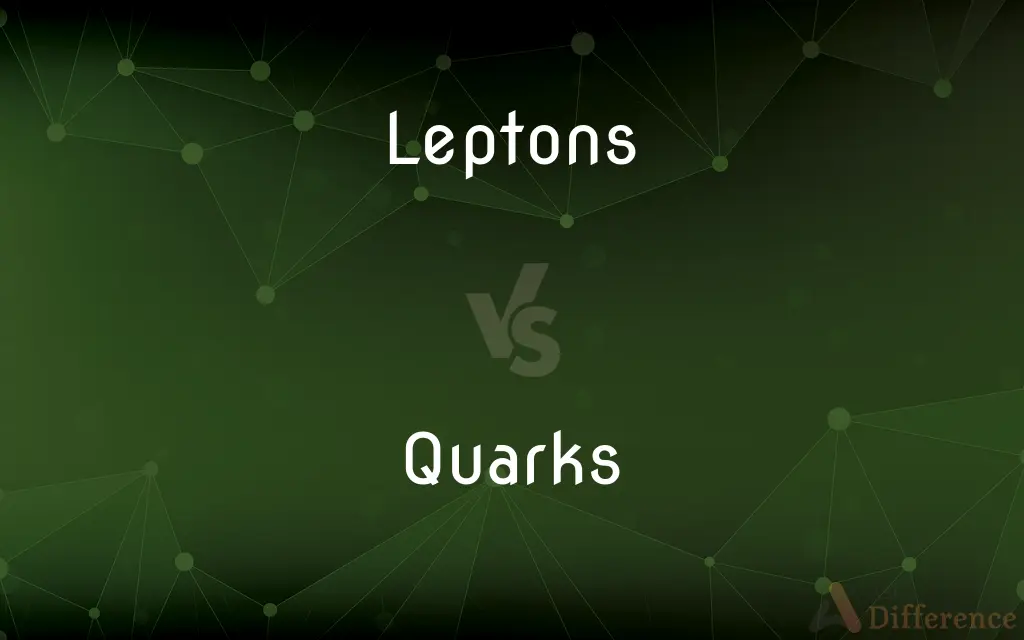Leptons vs. Quarks — What's the Difference?
Edited by Tayyaba Rehman — By Urooj Arif — Updated on April 15, 2024
Leptons are fundamental particles involved in weak interactions, while quarks participate in strong interactions, forming constituents of protons and neutrons.

Difference Between Leptons and Quarks
Table of Contents
ADVERTISEMENT
Key Differences
Leptons, such as electrons and neutrinos, are elementary particles that do not undergo strong nuclear forces. On the other hand, quarks are fundamental constituents of matter that combine to form hadrons, like protons and neutrons, through strong nuclear forces.
While leptons are always found as free particles in nature, quarks are never found in isolation due to a phenomenon known as color confinement. Instead, quarks exist in composite particles called hadrons, which include baryons and mesons.
Leptons are categorized into three generations: electron, muon, and tau, each accompanied by a corresponding neutrino. Quarks, however, are also divided into three generations: up and down, charm and strange, top and bottom, each differing in properties like charge and mass.
In terms of electric charge, leptons like the electron carry a full negative charge, while their neutrinos are electrically neutral. Quarks exhibit fractional electric charges, either +2/3 or -1/3, which are essential for the composite nature of hadrons.
Leptons interact through gravitational, electromagnetic, and weak forces. Quarks, in contrast, are unique in interacting through all four fundamental forces, including the strong nuclear force, which primarily governs their interaction within hadrons.
ADVERTISEMENT
Comparison Chart
Interaction Type
Weak, electromagnetic, gravitation
Strong, weak, electromagnetic, gravitation
Found in Nature
As free particles
Only in composite forms (hadrons)
Electric Charge
Full units (e.g., -1, 0)
Fractional units (e.g., +2/3, -1/3)
Examples
Electrons, neutrinos
Up, down, charm quarks
Generational Types
Electron, muon, tau
Up/down, charm/strange, top/bottom
Compare with Definitions
Leptons
Participates primarily in weak interactions.
Neutrinos pass through matter almost unaffected.
Quarks
Subject to strong nuclear forces.
Quarks are held together by gluons inside protons.
Leptons
Fundamental particle not subject to strong forces.
Electrons orbit the nucleus of an atom.
Quarks
Fundamental constituent of hadrons.
Protons are composed of two up quarks and one down quark.
Leptons
Each lepton generation has a neutrino counterpart.
The electron neutrino is associated with the electron.
Quarks
Never found free; always in composite forms.
Neutrons contain up and down quarks.
Leptons
Has associated generations (electron, muon, tau).
Muons are heavier cousins of electrons.
Quarks
Exist in pairs or triplets within hadrons.
Mesons consist of one quark and one antiquark.
Leptons
Exist as free particles in nature.
Electrons can be isolated in a cathode ray tube.
Quarks
Characterized by fractional electric charges.
The up quark carries a charge of +2/3.
Leptons
Any of a class of six elementary fermions, two in each of the three generations of fundamental fermions (one negatively charged and one neutral), and including the electron, electron neutrino, muon, muon neutrino, tauon, and tauon neutrino, together with their associated antiparticles, the antileptons. Leptons participate in weak interactions, but not strong interactions, and have masses generally less than those of mesons and baryons.
Quarks
Any of a class of six fundamental fermions, two in each of the three generations, one having an electric charge of - 1/3 , the other, + 2/3 , comprising the down, up, strange, charm, bottom, and top quarks. Quarks are the basic components of all hadrons.
Leptons
Plural of lepton
Quarks
Any of the six quarks' associated antiparticles, the antiquarks.
Quarks
A soft, creamy, usually unsalted cheese traditional to central Europe and made from cow's milk that is coagulated by the lactic acid produced by bacteria rather than by the use of rennet.
Quarks
Plural of quark
Common Curiosities
What are leptons?
Leptons are fundamental particles that do not participate in strong nuclear interactions.
Why can't quarks be found free?
Quarks are confined within hadrons due to the strong nuclear force.
What are quarks?
Quarks are elementary particles that make up hadrons like protons and neutrons and participate in strong interactions.
What are some examples of leptons?
Examples of leptons include electrons, muons, and tau particles.
What are some examples of quarks?
Examples of quarks include up, down, charm, and strange quarks.
How do leptons and quarks differ in interaction?
Leptons participate in weak and electromagnetic interactions, whereas quarks interact through all four fundamental forces, including the strong force.
What charges do leptons carry?
Electrons carry a negative charge, while neutrinos are neutral.
Can leptons be found free in nature?
Yes, leptons such as electrons and neutrinos exist freely.
How are quarks categorized?
Quarks are divided into three generations, each with unique properties.
Do leptons participate in strong interactions?
No, leptons do not participate in strong interactions.
What charges do quarks carry?
Quarks carry fractional charges, such as +2/3 or -1/3.
What is color confinement?
Color confinement is a phenomenon where quarks cannot exist independently outside of hadrons.
What are the generational differences between leptons and quarks?
Leptons and quarks are both organized into three generations, but differ in properties like mass and interaction type.
How are leptons categorized?
Leptons are categorized into three generations: electron-like, muon-like, and tau-like.
Can leptons be part of hadrons?
No, leptons do not form part of hadrons; they exist independently.
Share Your Discovery

Previous Comparison
Syringe vs. Vial
Next Comparison
Regard vs. RespectAuthor Spotlight
Written by
Urooj ArifUrooj is a skilled content writer at Ask Difference, known for her exceptional ability to simplify complex topics into engaging and informative content. With a passion for research and a flair for clear, concise writing, she consistently delivers articles that resonate with our diverse audience.
Edited by
Tayyaba RehmanTayyaba Rehman is a distinguished writer, currently serving as a primary contributor to askdifference.com. As a researcher in semantics and etymology, Tayyaba's passion for the complexity of languages and their distinctions has found a perfect home on the platform. Tayyaba delves into the intricacies of language, distinguishing between commonly confused words and phrases, thereby providing clarity for readers worldwide.
















































